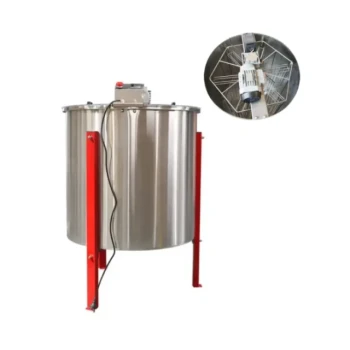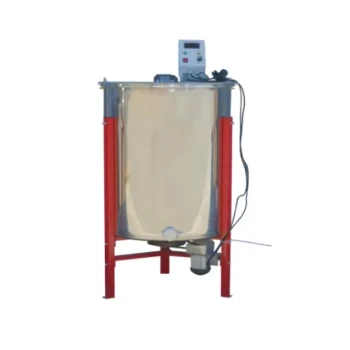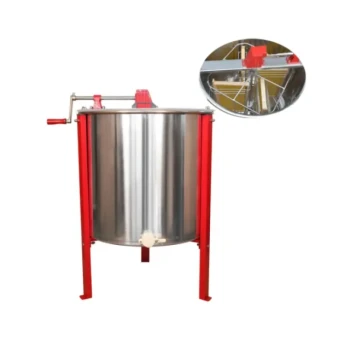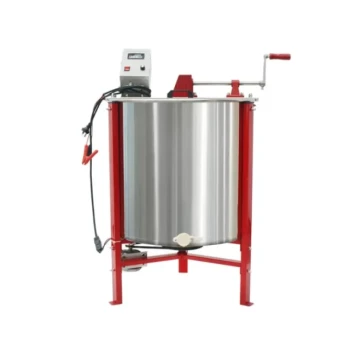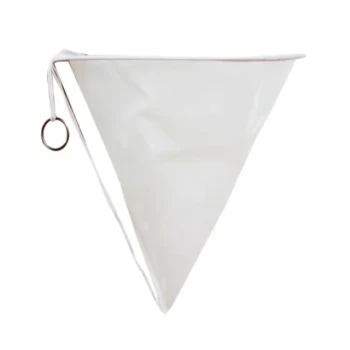The fundamental difference between radial and tangential honey extractors lies in how they position the frames and, consequently, how they extract the honey. A radial extractor orients frames like the spokes of a wheel, slinging honey from both sides at once. A tangential extractor places frames flat against the inside wall of the drum, extracting honey from only the outward-facing side, which requires you to flip the frames midway through the process.
The choice between a radial and tangential extractor is a direct trade-off. Radial models prioritize speed and efficiency, while tangential models prioritize the protection of the honeycomb, especially new or fragile comb.
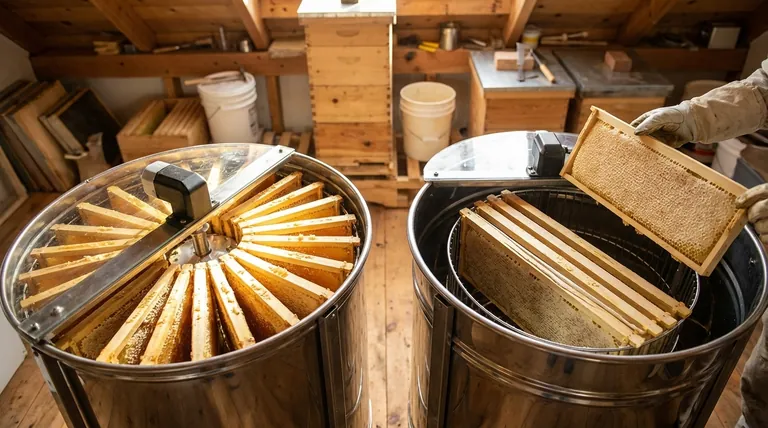
The Core Mechanical Difference: Frame Orientation
The design of an extractor directly dictates its function and efficiency. Understanding how each type holds the frames is the key to grasping their respective strengths and weaknesses.
How a Radial Extractor Works
In a radial extractor, frames are loaded vertically with the top bar facing outward, resembling the spokes on a wheel.
When the extractor spins, centrifugal force pulls honey straight out from the cells on both sides of the comb simultaneously. This design is inherently efficient, as it eliminates the need to stop and handle the frames during a cycle.
How a Tangential Extractor Works
In a tangential extractor, the frames are placed with the full face of the comb parallel to the extractor's outer wall. The comb is typically supported by a cage or mesh.
As it spins, centrifugal force pulls honey only from the outward-facing side. To extract honey from the other side, you must stop the machine, manually flip each frame, and then spin it again.
The Impact on Your Workflow
This mechanical difference creates significant downstream effects on the speed of your harvest and the health of your comb.
Speed and Efficiency
Radial extractors are significantly faster. Because they extract from both sides at once, the total spin time is shorter and requires far less manual intervention. This is the preferred design for beekeepers with more than a few hives, where time savings become critical.
Tangential extractors are more labor-intensive. The need to stop, open the extractor, flip every single frame, and restart the process adds considerable time and effort to your harvest day.
Comb Integrity
Tangential extractors offer superior comb protection. Because one side of the comb is fully supported by the extractor cage, there is a much lower risk of the comb "blowing out" or breaking apart under the force of extraction. This is especially important for new, uncured, or delicate comb.
Radial extractors place more stress on the comb. With this design, the wax structure must support itself against the centrifugal force. While this is rarely an issue with older, well-drawn comb, it can damage fragile comb if the extractor is started too quickly.
Understanding the Key Trade-offs
Beyond the core design, the choice is also influenced by power source and operational scale.
Manual vs. Electric Power
Most tangential models designed for hobbyists are manual (hand-crank), which keeps costs down but requires physical effort. Larger tangential and nearly all radial extractors are electric, offering speed and consistency at a higher price point.
The Risk of Blowouts
The primary risk with a radial extractor is damaging comb. To mitigate this, always start the extractor at a very low speed, allowing some of the honey's weight to be removed before ramping up to full speed.
The Labor of Flipping Frames
The primary drawback of a tangential extractor is the time lost to flipping frames. For a beekeeper with just two or three hives, this is a minor inconvenience. For someone with ten or more, the accumulated time can turn a quick job into an all-day affair.
Making the Right Choice for Your Apiary
Your decision should be guided by your budget, the number of hives you manage, and how much you value your time versus the integrity of newly drawn comb.
- If your primary focus is maximum speed and efficiency: A radial extractor is the clear winner, saving you significant time and labor, especially as your hive count grows.
- If your primary focus is protecting new or fragile comb: A tangential extractor provides better support, reducing the risk of costly damage and the need for bees to make repairs.
- If you are a hobbyist with 1-5 hives: A small, manual tangential extractor is the most cost-effective and practical starting point for your needs.
- If you are scaling up to 10+ hives: An electric radial extractor is a wise investment that will pay for itself in time and effort saved during harvest.
Understanding this core trade-off between extraction speed and comb safety empowers you to select the right tool for your specific beekeeping goals.
Summary Table:
| Feature | Radial Extractor | Tangential Extractor |
|---|---|---|
| Frame Orientation | Frames like wheel spokes | Frames flat against the wall |
| Extraction Process | Both sides at once | One side at a time; frames must be flipped |
| Speed & Labor | Faster, less manual labor | Slower, more labor-intensive |
| Comb Protection | Higher risk for fragile comb | Superior for new or delicate comb |
| Best For | Efficiency & scaling up (10+ hives) | Hobbyists & protecting comb (1-5 hives) |
Ready to Optimize Your Honey Harvest?
Choosing the right extractor is crucial for the efficiency and health of your apiary. HONESTBEE supplies durable, high-performance beekeeping equipment to commercial apiaries and beekeeping equipment distributors through our wholesale-focused operations.
We can help you select the perfect extractor—whether radial for speed or tangential for comb protection—to meet your specific scale and goals.
Invest in equipment that saves you time and protects your investment. Contact HONESTBEE today for wholesale pricing and expert advice!
Visual Guide
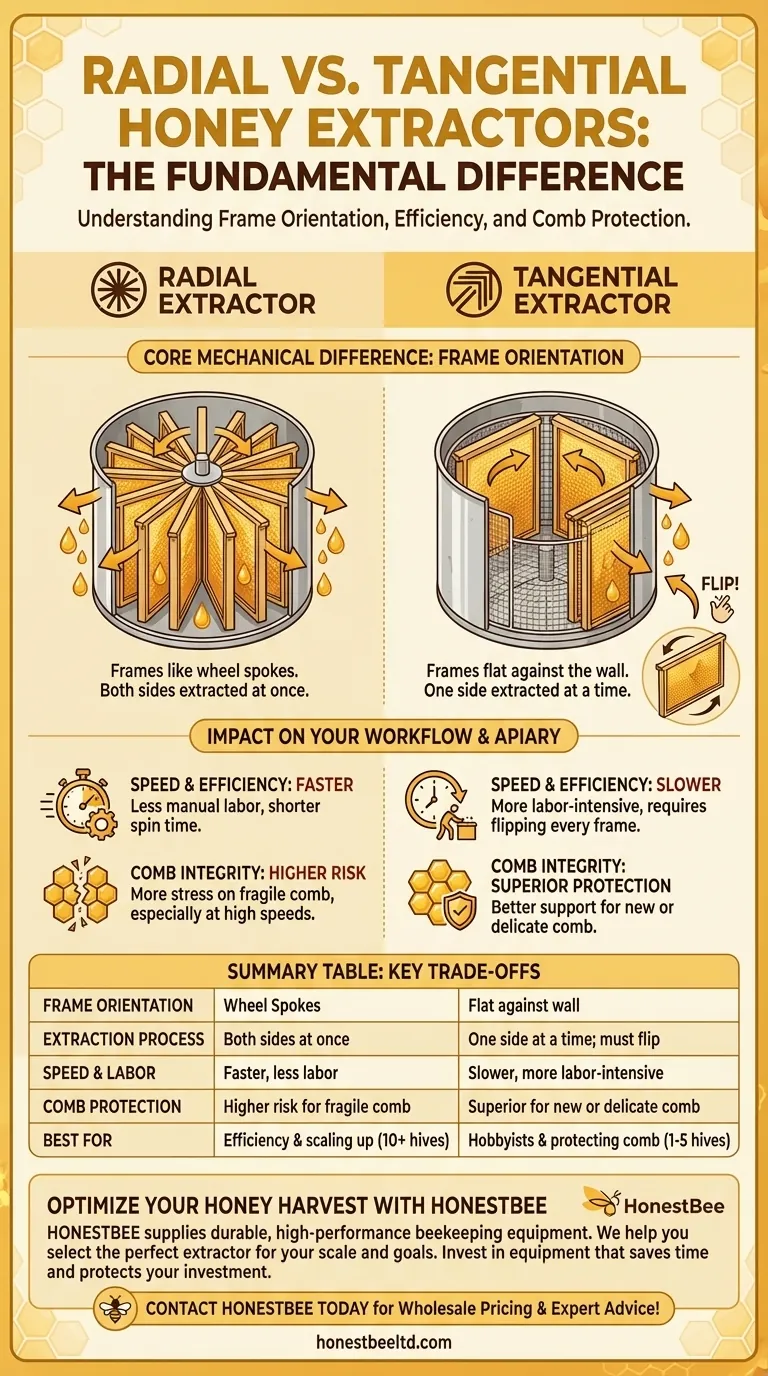
Related Products
- HONESTBEE 72 Frame Industrial Electric Honey Extractor for Beekeeping
- Stainless Steel Manual 8 Frame Radial Honey Extractor Machine for Beehives
- 8-Frame Electric Self-Reversing Honey Extractor Spinner for Commercial Honey Extraction Equipment
- Commercial 48-Frame Stainless Steel Honey Extractor
- Commercial Electric 12 Frame Honey Extractor Spinner Motorized Honey Extractor
People Also Ask
- How is honey harvested from Langstroth hives? A Guide to Efficient, Comb-Preserving Extraction
- What is the energy consumption like for automatic honey extractors? Maximize Your Harvest Efficiency
- What are some safety tips for using electric honey extractors? Ensure a Smooth, Hazard-Free Harvest
- What are the advantages of electric honey extractors? Boost Efficiency for Your Commercial Apiary
- What are the main types of honey extractor machines? A Guide for Beekeepers






